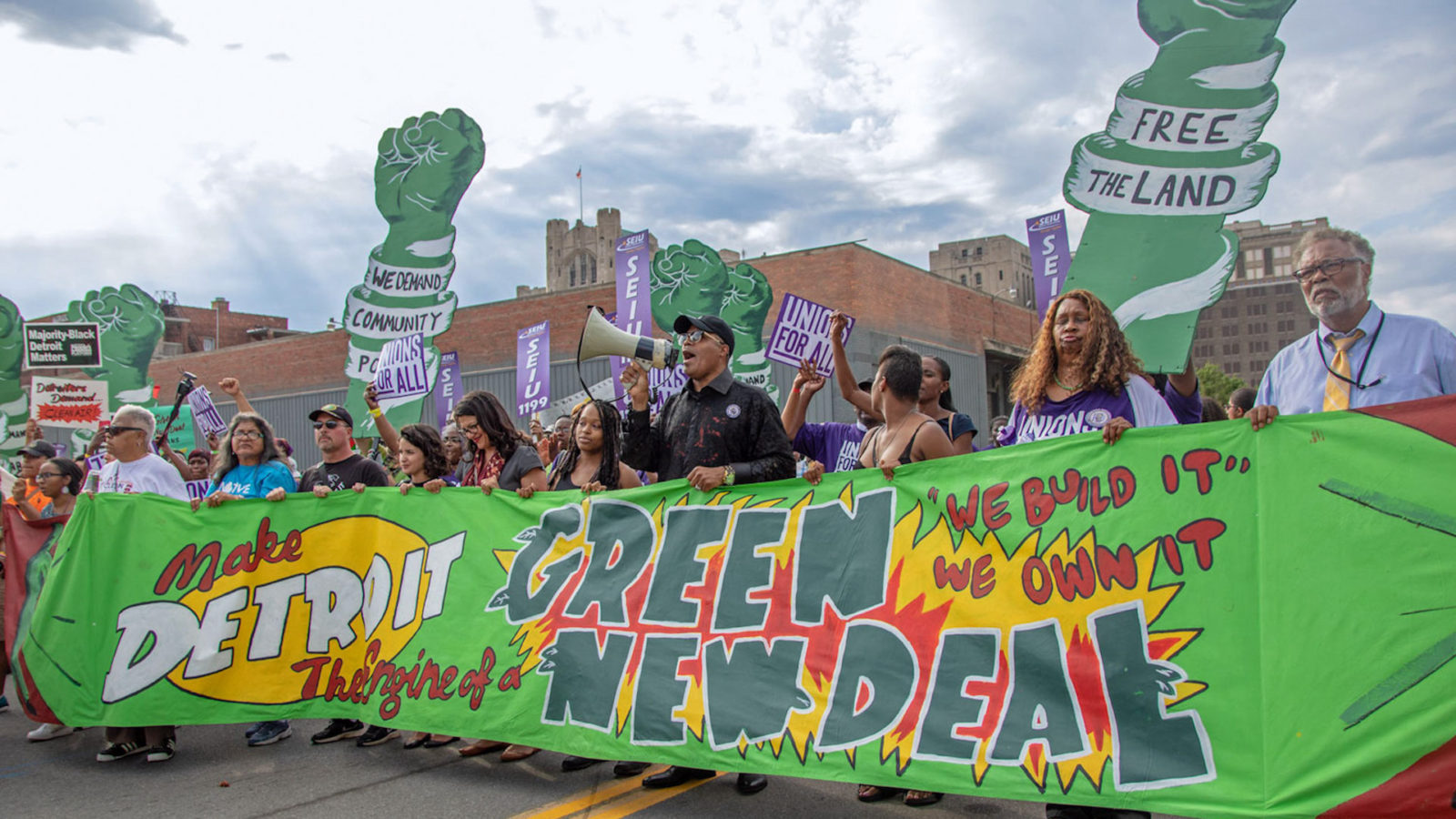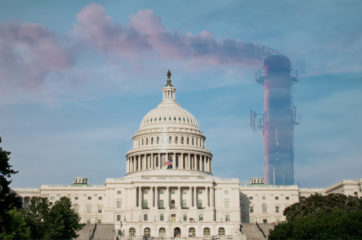This article was submitted by a member of our State Climate Policy Network (SCPN) — a rapidly-growing program within the organization that includes more than 16,000 advocates and policymakers across the country who are pushing for effective and equitable climate policies in their states. The views, thoughts, and opinions expressed in this article do not necessarily reflect those of Climate XChange.
Interested in submitting an article to be posted on our website?
Author: Madison McDermott
The Green New Deal Federal Resolution was introduced in 2019 by Rep. Ocasio-Cortez and Sen. Ed Markey as a plan to tackle a trifecta of crises: the climate crisis, economic inequality, and racial injustice. While federal action has an unclear path forward, many states, regions, and local governments have started thinking about their own Green New Deals (GNDs) to address this crisis now. Municipalities and localities are in the unique position to enact truly transformative climate justice policies due to their ability to be much more democratic, effective, and responsive. They are more in tune with locals’ needs and more accessible to hearing those needs, which in turn, allows them to be addressed. Local governments are the prime place for transformative climate action to occur now.
Birds Eye View of the GND
A recent poll from Data for Progress shows that 60 percent of U.S. voters support the GND. This support has materialized in local GND movements in every part of the country. And it’s not just in the U.S. that this momentum is building. The Green New Deal for Europe and the European Green Deal have both been introduced in the past two years. In the U.S., there are large regional coalitions building; in the South: Gulf South for a GND and Southern Communities for a GND, in the North: Renew New England Alliance, and in Appalachia: Reimagine Appalachia. In the West, individual city coalitions, like Seattle and San Diego, are working on GNDs. Certain states have also been considering their own GNDs: Virginia’s is already underway, California has a coalition supporting its statewide GND platform, and Illinois and others have been starting to build their support.
Some U.S. cities, like Providence and Portland, have also passed climate justice policies.. All of these plans are informed by the Federal GND — they are explicit plans to address not only the climate crisis but also racial justice, the housing crisis, the pandemic and a Just Recovery, transportation justice, economic inequality, and more. There is energy building all over the U.S., and the world, towards a more just, sustainable, and intersectional kind of governance.
We’re Not Waiting for the Federal Government to Act
The diversity of GND efforts are a reflection of the grassroots coalitions involved and the most pressing social and environmental issues in each location. In Boston, the former President of the Boston City Council was elected as mayor on a GND platform created using community input and “in partnership with community activists and organizations.” Michelle Wu’s plan focuses on the “kind of structural changes we need in order to provide our kids a future built on sustainable energy, good jobs, and healthy, connected communities.” The strength of a city-level approach is that Wu’s plan was informed by local communities. By working with community organizations and hosting a Green New Deal breakfast, which included over 60 Boston-area activists, residents, and leaders, the plan also focuses on issues that uniquely affect Boston. Issues like: how Boston is one of the most congested cities in the U.S., and how it has many areas that will face catastrophic flooding as sea levels rise. This deep analysis of the community’s needs and issues coupled with systematic policy creation to address them is not possible on a federal scale.
San Diego’s GND Alliance is taking a different kind of city-level approach. In San Diego, a large coalition of over 60 “businesses, environmental, labor, social justice, and community-based organizations, in partnership with countless volunteers” has worked to put together their plan and build support. While San Diego’s GND is focused primarily on the city, they have also expanded their efforts to include the region and other nearby cities to have a more comprehensive approach. Their aim is ultimately to have “A San Diego region that achieves zero carbon by 2035”. The San Diego GND Alliance focuses its efforts on community outreach to build support in addition to direct political action and ballot measures. They are currently working on two ballot measures focused on funding transportation and investing in stormwater management and clean water.
Another approach is Gulf South for a GND’s regional organizing. This GND-inspired movement is “advancing long-existing work towards climate, racial, and economic justice in five states across the Gulf South: Texas, Louisiana, Mississippi, Alabama, Florida.” This regional approach ensures that the policies will be community-specific to the South by incorporating “Southern perspectives, communities, and realities” to build momentum on a larger scale while staying unique to the needs facing communities. The strength of a regional movement lies in the unique challenges that face different regions. For example, the Gulf South faces many natural disasters, such as flooding and hurricanes, that are not as common or devastating as in other regions like the Northeast. The Gulf South for a GND also highlights other unique aspects of their region including that “fifty-one active military outposts and most of the nation’s strategic oil reserves are located in the Gulf South.”
The contrasting and complementary collection of GND efforts underway is inspiring. In addition to action at multiple scales of governance championing a diversity of issues, there are entirely volunteer-run organizations, well-funded organizations, grassroots coalitions, coalitions aiming at ballot measures or bills, and coalitions focusing on getting politicians on board. Whether or not we have leadership from D.C., GND efforts are clearly building momentum across the country.
Building Strategies to Address Our Shared Challenges
Green New Deal efforts all over the country face similar challenges within their unique ecosystems, circumstances, and structures. Finding funding to sustain momentum, building large and robust coalitions, and finding policy practitioners to pass and support their plans are common challenges.
Funding concerns arise in two ways. There is the primary issue of funding the organizations and coalitions that are supporting the GNDs. GND alliances need funds to host events, build their policies, and financially compensate the people who work on their plans. On the other hand, money is also needed to fund the policies that are a part of GNDs. Many Green New Deals include elements like overhauls to water and transportation infrastructure, increasing green jobs and technology, and other policies that require funding. Finding the money to pay for these initiatives can be a significant challenge to long-term momentum building. One example of a creative solution to this funding problem is the Portland Clean Energy Fund. Portland used a surcharge on large realtors to fund a grant program for organizations to pay for renewable energy projects, job training, and other green infrastructure. It is integral to highlight and learn more about ideas like this that could be replicated in other cities but might not be widely known.
Coalition building can also be challenging for organizations that want to bring on a wide variety of supporters including BIPOC organizations, organized labor, Indigenous groups, faith organizations, businesses, small grassroots groups, issue-specific organizations, and others. Learning how other organizations have built their coalitions can be very helpful for GND efforts just trying to get off the ground.
Coalition building is integral to another key strategy for success: building political power. For example, a state like Virginia, which is represented by more political moderates, could have a hard time getting those elected officials on board with sweeping, structural plans. One solution the San Diego GND has been testing is running political trainings on the GND to get their elected representatives on board. Other GND coalitions have even started to run their own candidates for office. There are many creative solutions to the structural barriers that have kept us from meaningful action on climate. Sharing them with other efforts can help spread the creative solutions that have worked and accelerate efforts all over the country.
Introducing the GND Hub
That is the goal of the Green New Deal Resource Hub. The Hub identifies these gaps and finds solutions like the Portland Clean Energy Fund or running your own candidates, and creates a space where these ideas can be shared easily, quickly, and effectively. By identifying patterns in resource gaps, the Hub has built out its action areas with toolkits, model policies, and more along with resources around strategies like Funding the Green New Deal and Building a Diverse Coalition.
As a movement support tool, the Hub was created to help support and accelerate GND efforts on the ground by providing the best resources and examples available and building a network of GND efforts and policy experts to share information and best practices. Our Hub aims to connect people with ideas and information with those who want to implement policy on the ground. The Hub is a dynamic resource that is constantly evolving with the ecosystem around it. We are currently building out the strategy section and building our network to allow for more information sharing and effective Green New Dealing!
As Green New Deal momentum builds around the country, the Hub is excited to connect with Green New Deal coalitions, interested grassroots organizations, policy practitioners, inspired elected officials, and issue area experts to facilitate connections and transformative climate justice solutions. If you are interested in getting involved, want to explore our resources, or have your own resources to share, please visit the Hub: https://www.gndcities.org/
Madison is a 3rd year Politics, Philosophy, and Economics student at Northeastern University. She recently worked at the Global Center for Climate Justice where she served as the Green New Deal Hub Coordinator working on curating GND resources for local communities to pass their own legislation.









